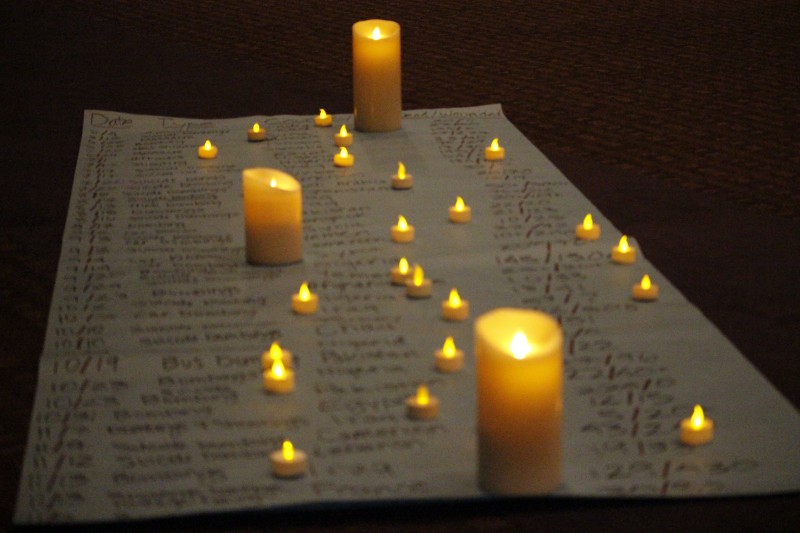
A peace march around campus culminated with a candlelight vigil Wednesday night as DePaul student interfaith scholars remembered the victims of several recent violent incidents around the world while also advocating for peace and dialogue.
The vigil is one of many recent events on campus and around the city in the past week to remember the victims of the recent Paris terror attacks, as well as similar acts of terror in Kenya, Lebanon, Iraq and other parts of the world.
The group of about 20 met in St. Vincent’s Circle shortly before 5:30 p.m. where candles were passed out and opening remarks were given. The howling wind prevented the candles from being lit, but the group improvised by getting flameless candles.
Victoria Nabel, a student who transferred to DePaul this year, set the tone at the beginning by describing her personal connection to the events in the Middle East.
“What’s been going on the world with ISIS and all these other terrorist attacks hits close to home because my uncle on my dad’s side is now a refugee in Iraq, and they’ve been displaced and taken from their home and have had everything taken from them,” Nabel said.
She added that more students are affected than one might think, which made the event even more important.
“This hits close to home for many DePaul students, because seeing our friends and our relatives and loved ones overseas is really hurtful.” Nabel said. “I think this is an important opportunity as DePaul students to unite whether you’re Muslim, Catholic, Jewish, atheist, it doesn’t matter.”
Unite they did, as the marchers walked around campus silently, finishing in front of the Father Egan statue before heading into the Student Center for the vigil. Buddhist, Catholic, Jewish and Muslim interfaith scholars spoke.
“If somehow your silence can drown out the hate, if our dim lights can somehow overpower explosions and gunfire, if just inside of ourselves we’ve thought, we’ve stopped, we’ve meditated, we have grieved, then tonight is not in vain,” said Mat Charnay, a Jewish interfaith scholar.
Many of the speakers touched upon the desire to have a dialogue with each other, especially in light of heated political rhetoric in the past few days that some perceive as being anti-Islam.
Muslim interfaith scholar Shourouk Abdalla, a junior, used her time at the microphone to cite several verses in the Koran that directly contradict that actions of terrorist groups such as ISIS.
“There is nothing Islamic about the Islamic State,” Abdalla said. “Calling it that name plays into the group’s unfounded logic.”
She challenged her fellow interfaith scholars to defend Muslims, who she said are exhausted from having to defend their religion to others. Catholic interfaith scholar Nicolette Prociuk echoed that sentiment.
“I think it has a lot to do with other faiths defending them as well, especially because as Shourouk said, they are tired and exhausted after defending themselves for so long,” she said. “It’s time for other faiths to step up and support them as well.”
Shourouk said that the event was put together after the attacks in Paris, which left many unsettled and grieving.
“So we felt like we had to form some type of vigil where DePaul students can come and grieve together, and come and support the victims together and make a stance that we stand against extremism and are against terrorism and we’re for unity,” Abdalla said.
Attendee Joey Kaigler, a junior, said he was glad that his classmates were aware of the world around them.
“I think it’s good that we’re all recognizing what’s happening in the world and we’re all thinking about the tragedies that have been going on and just to send our prayers out,” Kaigler said.
According to the Office of Interfaith Programs, six or seven “students are chosen for their ability to encourage people to follow their own religious and spiritual traditions while being respectful and open to learning and sharing with those of other traditions.”


Arafat • Nov 19, 2015 at 7:01 pm
One thing I commend Islam for is it provides lots of opportunities for interfaith vigils.
Can I write this or will the First Amendment rationalizers cut off my freedoms? (Even if it is 100% true.)